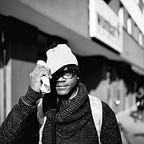Burna Boy is working a myriad of miracles
Is there anyone unconvinced that Burna Boy is the most versatile of Nigerian popstars?
Take a look at this list of a half-dozen Burna Boy singles: ‘Ye’, ‘Gbona’, ‘On the Low’, ‘Dangote’, ‘Thuggin’, ‘Darko’. There is pop, reggae, trap, rap and Afrobeat across that list. The musical influences are a mix of Nigerian, British, Jamaican and American influences.
The last two songs in the list above are from his new project (with Los Angeles production duo DJDS) the Steel & Copper EP. Nothing from his preceding singles, all of them hits across his home country, could have prepared his fans and listeners for the project. In fact, the listener has to go back a few years, to 2016, to what may be called the Steel & Copper prequel, the Redemption EP.
That project had shown Burna Boy working his trap music bona fides but it had space for African percussion patterns and even a song in Yoruba. On Steel & Copper, which is four tracks long, there are no such concessions to his local audience. (Or maybe his name-dropping Greek basketballer of Nigerian origin Giannis Antetokounmpo on ‘34’ is a concession, given that he plays in the American league?)
That he is recognisable speaks to how much his peculiar timbre has become in the pop landscape. But his voice is not quite as important a thread connecting both EPs as much as how personal both works are. Where Redemption processed some of the man’s emotions, specifically his paranoia concerning his success and friendships, Steel & Copper is more invested in the physical, in terms of violence and survival.
The EP’s title refers to weapons. Its last song ‘Thuggin’ tells its own story when he sings, “This life, done took my brothers / But I, I’m still thuggin’ anyway”. On ‘Darko’, he sings, “What you know about Don Gorgon? / Me make your baby turn orphan”.
Yesterday, Burna Boy released a single video for both songs and made the violence embedded in the pair of songs explicit.
As ‘Thuggin’ plays, we watch Burna Boy speak heatedly on the phone and later an older lady begs him but he leaves her and gets into a fight outside at dusk; a friend is shot and the song stops playing. We then see Burna Boy, who earlier had bathed a child, in anguish as he beholds the body of his friend. A group of women surrounds the body, performing some contemporary dance ritual on the corpse. Soon, ‘Darko’ begins to play. There is a church, some dancing, lifting of the corpse from the earlier song and some kind of a procession.
Like some of Burna Boy’s own music, the video defies complete comprehension and is mostly impressionistic. And yet, the mood is unmistakably sober, spurred by the sluggish, drugged-up beat and Burna’s drawled lyrics, as if whatever crime committed by the songs’ hero is done reluctantly. As he says in ‘Thuggin’, “I don’t know better”.
It now appears we have two Burna Boys: the joyful Afropop one and the introspective trap music act. Perhaps it is understandable that his team markets the first to Nigerians and save his introspection for his more international projects. Nevertheless, the true fan would have to reconcile both Burnas. Luckily, the tight exquisiteness of Steel & Copper should make that easier.
Just one small note: You won’t be dancing much — but you’d be rewarded in other ways.
